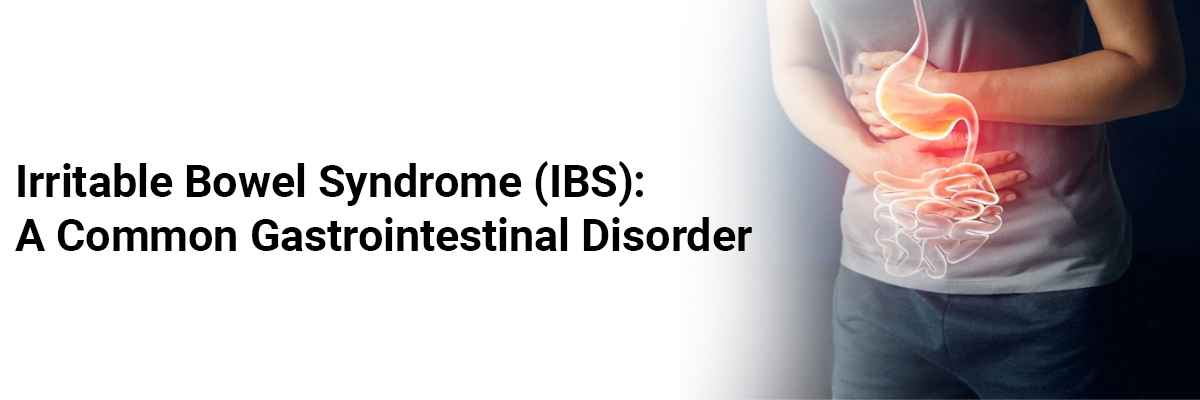
 IJCP Editorial Team
IJCP Editorial Team
Irritable Bowel Syndrome (IBS): A Common Gastrointestinal Disorder
Irritable bowel syndrome, or IBS, includes a group of symptoms that affect your digestive system. It's a common but discomfiting gastrointestinal disorder, generating excessive gas, abdominal pain, and cramps. IBS is also known as Spastic colon, Irritable bowel or colon, or Nervous stomach (as symptoms are often triggered by emotional stress, tension, and anxiety).
IBS doesn't harm your digestive tract or boost the risk of colon cancer. Diet and lifestyle changes can often manage its symptoms.
Classification and Types of IBS
IBS is classified under functional gastrointestinal (GI) disorder or a disorder of gut-brain interaction that has problems with working your gut and brain together. These problems make your digestive tract very sensitive and change the contractility of the bowel muscles, resulting in abdominal pain, diarrhea, and constipation. People with IBS often have normal and abnormal bowel movements on other days.
There are various types of IBS, which are categorized based on the type of bowel movement problems. The kind of IBS affects your treatment as certain medicines only work for specific IBS.
IBS is classified as-
• IBS with constipation (IBS-C): where the poop is hard and lumpy.
• IBS with diarrhea (IBS-D): where the poop is loose and watery.
• IBS with mixed bowel patterns (IBS-M): when hard-lumpy bowel and loose-watery movements transpire simultaneously.
Causes and Risk Factors
Research suggests that these people may have excess bacteria in the GI tract, contributing to symptoms. If you have IBS, you may experience more than the usual contraction of the colon muscle, which will cause cramps and pain. You may also have diminished pain tolerance.
IBS mostly emerges in the late teens to early 40s. Women are twice likely as men to get IBS, and it may happen to multiple family members.
The risk of IBS increases if you have-
• Family history of IBS.
• Stress, tension, or anxiety.
• Food intolerance.
• Physical or sexual abuse in the past
• Severe digestive tract infection.
IBS patients notice that certain things trigger their symptoms, with common being some foods, medication, and Emotional stress. Some researchers suggest IBS as the gut's response to life's stressors.
Sign and Symptoms of IBS
If you have IBS, you may encounter symptoms such as-
• Abdominal pain or cramps, mainly in the lower half of the abdomen.
• Bloating.
• harder or looser than normal Bowel movements
• Modifications in your frequency of bowel movement
• The feeling of the insufficient evacuation of the stool.
• Diarrhea, constipation, or alternating between the two.
• Excess gas.
• Mucus in your poop.
Women with IBS may experience increased symptoms during their periods. These symptoms usually repeat, making you feel stressed or upset. You'll feel better physically and mentally as you learn how to manage flare-ups.
Diagnosis and Treatment for IBS
If you have any of the above mentioned symptoms, it is advisable to visit your doctor. They can diagnose IBS with a medical history and a physical exam. They may also advise other tests, like Blood tests, stool samples, X-rays, colonoscopy, etc., to confirm a diagnosis depending on your symptoms.
The doctors often use Rome criteria to establish a diagnosis of IBS. It necessitates the occurrence of stomach pain and discomfort, averaging at least one day a week in the last three months. It must be accompanied by at least two of the following: Pain and discomfort associated with defecation, altered frequency of defecation, or a change in stool consistency.
There is no specific therapy for IBS that works for everyone, yet most can find a treatment that works for them. Typical treatment options include dietary and lifestyle modifications. A dietitian can help you create a customized diet. Your healthcare provider will personalize your treatment plan as per your needs.
Dietary changes for IBS mainly advocate-
• Increase fiber in your diet with fruits, vegetables, grains, and nuts.
• Consume supplemental fiber on your doctor's advice.
• Drink plenty of water, about eight 8-ounce glasses/day.
• Avoid caffeine
• Limit cheese and milk, as people with IBS usually have Lactose intolerance. Receive calcium from other sources, like broccoli, spinach, salmon, or supplements.
Activity changes for IBS-
• Get regular exercise
• Quit smoking.
• Practice relaxation techniques.
• Consume frequent but smaller meals.
Medical changes to manage IBS-
• Antidepressant medications for depression, anxiety, and significant abdominal pain.
• Other medicines to ease diarrhea, constipation, or abdominal pain.
• Probiotics, aka "good bacteria," to help improve symptoms.
Some individuals may not respond to medical treatment. Hence the doctor may refer you for mental health therapies like
• Cognitive behavioral therapy (CBT).
• Hypnotherapy.
• Biofeedback.
Remember that there is no known cause for IBS, so you can't prevent or avoid it. Watch your symptoms from flaring up by avoiding triggers.
The bottom line
You may find living with irritable bowel syndrome challenging as its symptoms often interfere with daily chores. But the good thing is that IBS is manageable. Though no cure exists, you can improve symptoms through diet and lifestyle changes. Talk to your healthcare provider if you have stomach symptoms that aren't going away. Together, you can tailor an IBS treatment plan that works for you.

IJCP Editorial Team
Comprising seasoned professionals and experts from the medical field, the IJCP editorial team is dedicated to delivering timely and accurate content and thriving to provide attention-grabbing information for the readers. What sets them apart are their diverse expertise, spanning academia, research, and clinical practice, and their dedication to upholding the highest standards of quality and integrity. With a wealth of experience and a commitment to excellence, the IJCP editorial team strives to provide valuable perspectives, the latest trends, and in-depth analyses across various medical domains, all in a way that keeps you interested and engaged.










.jpg)








.jpg)

Please login to comment on this article